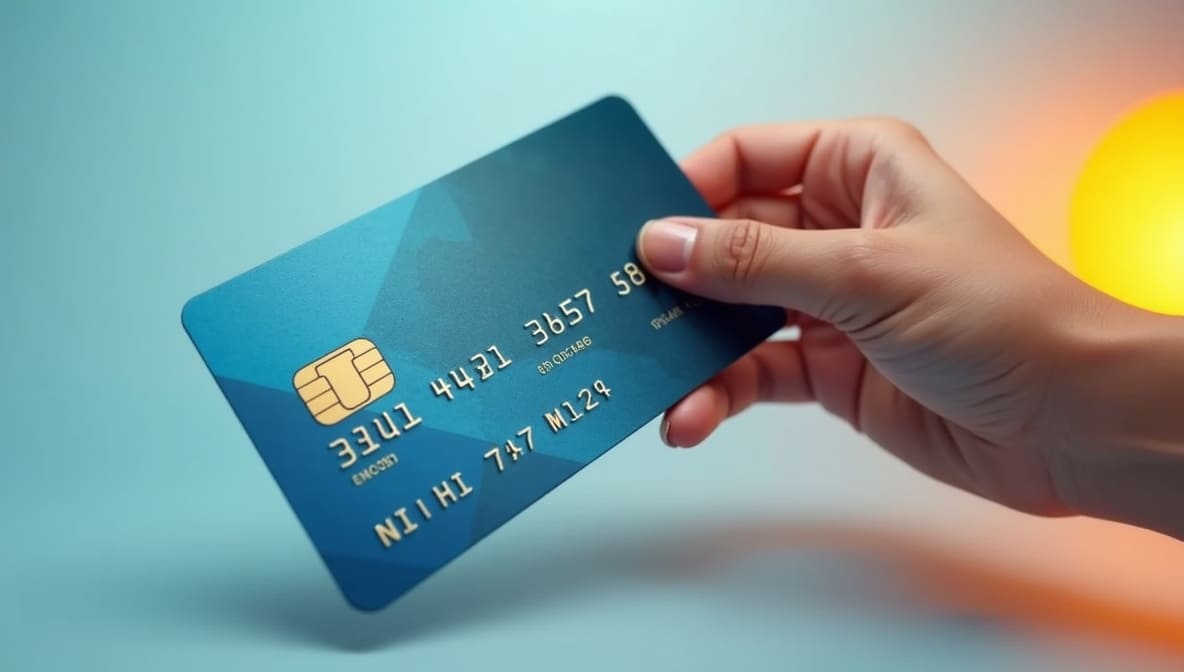When making large purchases, a credit card can be a valuable tool—if used wisely. Instead of immediately draining your savings fund or taking out a personal loan, a card with a 0 percent introductory APR allows you to buy now, pay later without accruing interest for a set period. This option gives you more time to pay off big-ticket items like groceries, travel, appliances, or even remodeling your home. Additionally, some cards let you earn rewards and gain access to additional benefits, making your spending work in your favor.
However, using a credit card for finance requires careful planning. If not managed well, you risk racking up fees, impacting your score, and accumulating debt. According to the Bankrate Credit Card Debt Survey, many Americans carry credit card debt month after month, showing how easy it is to fall into a financial trap. The best idea is to strategically swipe your card when you know you can pay off the bill on time. Whether you’re footing the cost of a big trip or facing an emergency expense, choosing the right card—such as a high-earning rewards card or one with an intro APR—can be handy, depending on your spending habits. The key is to learn when to use a credit card and when not to.
What Is a Credit Card?
A credit card is a thin, rectangular piece of plastic or metal issued by a bank or financial services company that allows cardholders to borrow funds for making purchases. It is widely accepted by merchants for payment and remains one of today’s popular methods for buying goods and services. Unlike a debit card, which requires you to withdraw deposited money from a checking account, a credit card lets you borrow, making it an ideal choice for financing expenses when managed wisely.
When you use a credit card, the issuer may impose conditions such as paying the borrowed money back either in full by the billing date or over time with applicable interest and additional charges. Many businesses prefer accepting credit over cash since it allows customers more flexibility. Some cards also provide perks like cash back, discounts, reward miles, and other benefits that can enhance your spending experience.
Credit cards offer access to a separate cash line of credit (LOC) that allows cash advances through ATMs, tellers, or convenience checks. However, these transactions often come with higher rates and no grace period, making them a costly alternative. Issuers also preset borrowing limits based on an individual’s credit rating, ensuring responsible use. If mismanaged, exceeding these limits can lead to financial trouble, especially for those with bad credit.
Many stores, institutions, and banks offer various secured options for people who want to build or improve their credit. These include secured cards, which require a deposit, and other alternatives designed for different financial needs. Whether you swipe, insert, or tap your card, understanding the key differences between credit and debit usage is essential. Unlike debit, failing to repay a credit balance can result in an overdraw, impacting future financial stability.
With the ability to access funds instantly, manage transactions, and benefit from rewards, credit cards remain a preferred financial tool. However, it is crucial to complete payments on time to avoid unnecessary fees. Reviewing your statement period regularly and staying within your preset borrowing limits can help maintain good financial health. These takeaways highlight why using a credit card responsibly can be a smart decision when financing major expenses.
How a Credit Card Works?
When used wisely, credit cards can be a powerful financial tool. However, they also come with responsibilities. Many cards charge a higher annual percentage rate (APR) compared to other consumer loans, making it important to pay attention to interest charges. If you leave unpaid balances, your card issuer may impose new charges that can grow over time. The best way to avoid unnecessary costs is to pay off your purchase before interest starts accruing.
One key advantage of some credit cards is the 0% introductory offer. This means for an initial period after your account opening, you can make purchases without paying interest. However, once the period expires, the standard rate applies. To maximize this benefit, it’s a good practice to clear your balances before the grace period ends. By law, issuers must offer at least 21 days before interest begins to accrue on new purchases, giving cardholders a window to make payments without additional fees.
Understanding how interest accrues can help you make better financial choices. Some cards calculate interest daily, while others use a monthly method. Since a daily system translates into higher charges over the long run, it’s important to understand your card’s terms. If you’re considering a balance transfer to a lower-interest card, ensure that you’re not mistakenly switching to a card with a daily accrual system, as this could nullify the savings you hoped to gain.
Additionally, if you carry a previous balance forward from month to month, new purchases may start accruing interest immediately, as there will be no grace period. This is why clearing old balances can be beneficial before making further transactions. A well-managed credit card can be a valuable financial resource, but a lack of planning can lead to unnecessary debt.
Using a credit card wisely means keeping track of due dates, payment structures, and promotional periods. Making timely payments, utilizing 0% introductory offers, and understanding how interest rates work will help you make the most of your card while avoiding unnecessary fees. A credit card is more than just a spending tool—it’s a financial responsibility.
Different Types of Credit Cards:
Many banks, credit unions, and financial institutions offer different types of credit cards to meet the needs of various customers. Some cards provide incentives like cash back, airline miles, hotel room rentals, and gift certificates to attract users. These benefits can make purchases more rewarding, especially when used wisely. Many major retailers also offer store credit cards that provide special discounts and promotional notices for loyal shoppers.
The most popular credit cards include Visa, Mastercard, Discover, and American Express. These are widely accepted anywhere and often come with added perks like fraud protection and extended warranties. Some large retailers issue branded or co-branded credit cards that can be used both in their retail stores and with other merchants. These cards help generate loyalty by offering exclusive special sales and better financing options.
For people with limited or poor credit histories, secured credit cards can be a useful option. These require a deposit, which acts as collateral and determines the credit limit. With responsible usage over time, cardholders may have their security deposits refunded, helping them build their credit. Unsecured credit cards, on the other hand, do not require a deposit and usually offer higher limits but may have higher interest rates.
Another option is prepaid debit cards, which work similarly to secured credit cards. Instead of borrowing, customers deposit money into a linked bank account and use the card until the available balance runs out. While these do not build credit, they can be helpful for budgeting and controlling spending.
Many credit cards come with fees, but some offer no-annual fees, making them more affordable for everyday use. While advertised as a simple option, these cards may not provide a ton of perks like rewards or special discounts. However, some people prefer them to avoid extra costs. Those who don’t mind paying a yearly fee might find a better card that helps them earn rewards faster and take advantage of additional benefits.
Choosing the right credit card depends on individual needs. Whether looking for cash back, travel perks, or a way to build credit, there are many options available. Understanding the differences between secured, unsecured, and prepaid debit cards can help customers make informed financial decisions while maximizing their savings.
Building Credit History With Credit Cards:
One of the best ways to build a credit history is by using a credit card responsibly. Both secured and non-secured cards allow consumers to make purchases, whether online or in stores, while also helping them establish a strong financial reputation. Unlike cash transactions, credit card usage is reported to major agencies, which track payments and purchasing activity. This means that responsible cardholders can improve their credit standing over time, leading to strong scores and better borrowing opportunities.
To maintain a good credit profile, a person must follow a combination of smart financial habits. Making on-time payments and avoiding late fees are essential. Keeping utilization low by staying within the credit limit and maintaining a healthy debt-to-income ratio also plays a big role. A rising credit score makes borrowers more attractive to lenders, opening doors to extend lines of credit and even upgrade to a more regular card with better perks.
It’s crucial to use credit cards responsibly by promptly paying off the balance each month. However, card issuers do not allow another credit card to be used for direct balance payments. This means that financial discipline is necessary to avoid falling into debt.
Many people have struggled to improve their credit standing. Once they have finally paid off their balance, they might consider closing the account. However, closing a long-held card can hurt a person’s credit history because they lose that account’s payment record and available credit. Instead of closing it, keeping it open with minimal usage can be a smarter strategy.
By understanding these factors, credit cards can become powerful tools for financial growth rather than sources of debt. Used wisely, they help individuals build a stable financial future while providing the flexibility and convenience of cashless transactions.
Benefits of Using a Credit Card for a Large Purchase:
Using a credit card for a large purchase can be a smart decision when done responsibly. Many cards come with lucrative perks that make spending more rewarding. A great example is the sign-up bonus that some new cardholders receive when they spend a specific amount within the first few months. This could mean earning cash back, points, or even miles for purchases you were already planning. If used wisely, this can be a great opportunity to maximize rewards while covering a necessary expense.
Another advantage of using a new credit card is the 0 percent introductory APR offer. This can help spread the cost of a big purchase over time without accruing interest—as long as you make at least the minimum payments every month. However, missing payments can lead the issuer to revoke the offer, causing you to be charged the regular rate. With the right strategy, this feature can provide a flexible way to chip away at a large balance without financial strain.
Many credit cards also provide rewards that can add extra value to your spending. Whether it’s cash back, travel perks, or other benefits, using a rewards card for a significant purchase can help you earn points that can later be redeemed for various perks. Some cards offer extended warranty protection, making them useful for buying an appliance or expensive electronics. Other benefits, such as travel insurance and free checked bags, can enhance a trip while adding peace of mind. Additionally, purchase protection can help if an item, like a smartphone, gets stolen or damaged.
A growing feature among credit cards is the buy now, pay later option. This allows you to break up a billing cycle into smaller monthly payments, making it easier to manage expenses. While the issuer may charge interest fees, they often come at a fixed lower rate compared to the regular credit card interest. This can be a practical way to spread out payments while ensuring you can still afford your purchase without feeling overwhelmed.
In urgent situations, a credit card can serve as a lifeline for emergency expenses. If an unexpected cost arises, applying for a 0 percent intro APR card with a long introductory period might give you the breathing room needed to handle the situation. However, it’s essential to make at least the minimum payment every month and be aware of when the period ends to avoid being hit with regular APR and interest charges. Seeking counselor advice can also help in minimizing debt while managing emergency financial needs.
By using credit cards wisely, you can take advantage of their perks, enjoy protection, and manage big purchases without unnecessary financial stress. The key is to have a solid plan, stay disciplined with payments, and use credit in a way that benefits you rather than becoming a burden.
Risks of Using a Credit Card for a Large Purchase:
Using a credit card for a big-ticket item might seem like a smart move, but it comes with certain risks. If you swipe your card without planning how to pay off the balance, you could end up in financial trouble. Every billing cycle, the interest fees can add up quickly, making your purchase much more expensive over time. The average interest rate is currently 20 percent, which means carrying a balance can cost you a lot in the long run.
Another important factor to consider is how it affects your credit score. One key factor in your credit score impact is utilization ratio, which compares how much of your available credit you are using. Experts recommend keeping this ratio below 30 percent to maintain a strong score. If you make a big purchase that gets close to your limit, your score might be negatively affected.
Carrying a balance for too long can make it harder to manage other expenses. If you spend beyond your means, you might struggle to pay your bills on time. This can lower your credit score and make it more difficult to qualify for loans in the future. While credit cards can be useful for purchases, they should be used wisely to avoid debt problems.
Before using a credit card for a large purchase, consider whether it is the ideal choice. If you cannot pay off the full amount, it might be better to look for alternative payment options. A well-managed credit card can help build your credit, but misusing it can lead to financial stress.
Would you rather wait and save up for a purchase, or take the risk of carrying a balance with high-interest fees? The decision should be made carefully to avoid unnecessary debt.
Alternatives to Credit Cards:
If you’re planning a pricey item, relying on a credit card may not always be the best choice. While credit cards offer flexibility, there are other ways to cover big expenses without worrying about high-interest charges. Thinking ahead and having a savings plan can help you manage finances better. If you can predict a future purchase, you can set aside a specific amount each month to save money. A high-yield savings account with current rates averaging 4.64 percent allows you to earn interest while preparing for major expenses.
For those who need immediate funds, a personal installment loan could be a better alternative. Instead of using a credit card, you can borrow money up front and repay it in fixed payments or installments. These loans can be used for different purposes like a wedding, medical bills, or debt consolidation. If you have good credit, you might qualify for a better rate than what most credit cards offer.
Another option is to use a buy now, pay later form of payment. Many retailers have started partnering with companies like Affirm, Afterpay, Klarna, PayPal Credit, and Zip to offer flexible payments. Instead of paying all at once, you can follow a payment plan without a credit check. Just make sure to read the agreement carefully and ensure you can afford the payments.
Homeowners have another useful tool: a home equity line of credit (HELOC). This allows you to borrow against your home and use the funds for expenses like home repairs or education. However, since your home is used as collateral, it’s critical to repay on time to avoid financial risks. A HELOC may come with tax advantages and a better interest rate than other loans.
Lastly, if you are expecting an income tax refund, consider using it for your expense instead of adding it to your bank account. This approach reduces financial stress and minimizes the impact on your budget. Finding the right alternative depends on your financial situation and spending habits.
FAQ’s:
Which is a positive reason for using a credit card to finance purchases?
Using a credit card is safer than carrying cash and can offer stronger fraud protections compared to debit cards. You can earn significant rewards without changing spending habits, making every purchase more valuable. It’s also easier to track expenses, helping you stay organized. A responsible use of credit cards is the easiest and fastest way to build credit for future financial opportunities.
What is the Benefit of Credit Card in USA?
Credit cards can be a great financial tool if used wisely. They offer fraud protection and can help build credit history when used responsibly. Some cards allow users to earn cash back or other rewards on purchases, making everyday spending more beneficial. With the right habits, a credit card can be a secure and smart way to manage finances.
Why is Using a Credit Card a Good Idea When Making a Purchase?
Using a credit card wisely can give you an advantage by allowing extra time before your payment due date. This means you can earn interest or dividends on your money while keeping your spending under control. If you stay disciplined and check your expenses, you can make an effective purchase and delay paying the bill without extra costs. Making effective use of this period helps you manage cash flow better.
Conclusion:
Using a credit card for financing purchases can be a smart financial move when managed responsibly. It provides flexibility, allows you to earn rewards, and offers extra time to make payments without immediately depleting your funds. However, to avoid high-interest charges and debt, it’s crucial to stay disciplined, check spending habits, and always pay bills on time. Whether you’re making a large purchase, building credit history, or leveraging benefits, effective use of a credit card can enhance your financial well-being rather than become a burden.





